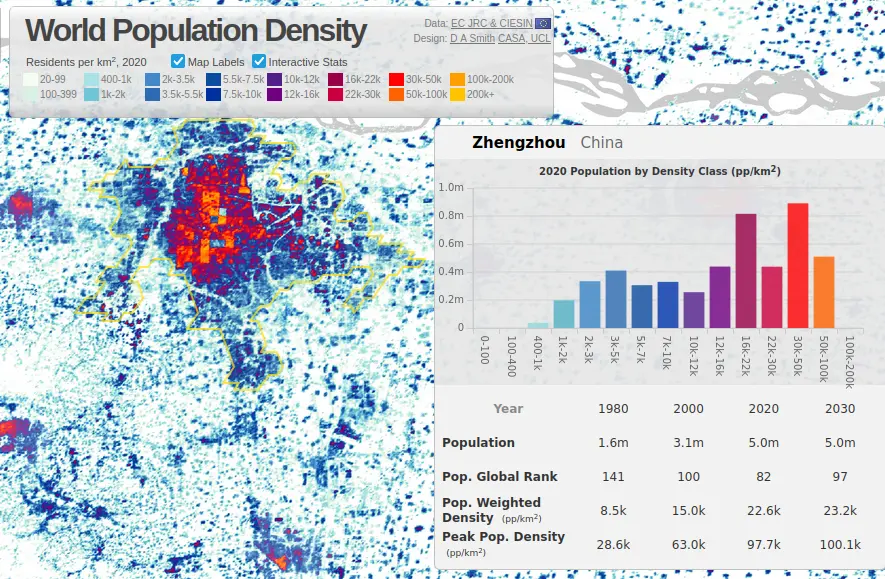I guess it’s easier to undertake a massive infrastructure project if you can just tell residents to move it or else…
The idea that you get to put a stake in the ground and then that plot of dirt yours forever is insane. The amount of infrastructure projects in Denmark that are put on hold indefinitely because locals are upset, not at being forced to move, but because they think they own their land and the view, is nuts.
I agree. There needs to be a middle ground. In Germany, NIMBYs opposed to wind turbines because they’re supposedly loud and ugly, as well as NIMBYs opposed to high-capacity power lines have become somewhat of a meme.
The right way to handle this is buying the land at a reasonable price (where you actually need to build on someone’s land, not buying ‘the view’).
NIMBYs opposed to windpower seems like a tale as old as time. Case in point, read Don Quixote, old man is so angry at wind turbines he actually tries to joust them through
That’s not the story in Don Quijote. Guy is nuts and mistakes the windmills for giants.
Isn’t that why people are so scared of modern windmills? They think they’re giants?
Let’s not forget that he was an old guy with the hots for a younger woman - Dulcinea - who he wanted to impress, hence attacking the “giants”.
There are many levels in Don Quixote de la Mancha.
The irony is even bigger in the Netherlands: our proudest most beautiful national icon: old wind power.
New wind power however it’s deemed ugly and ‘visual pollution’ even though it’s the same thing and clean energy.
I’ve heard people around me saying they make people sick. By spinning, I guess?
For the same reason as WiFi supposedly making people sick.
To be clear, what I mean by that is “its utter horse shit”.
WiFi at least does go through you. It’s harmless, even if it was four orders of magnitude more powerful it’d just cause heating, but there’s contact.
If I had to think of a reason a windmill could cause illness, I’d guess infrasound, but the the proponents seem to think it’s something about the way they reflect sunlight. It reminds me of when people in England though the first trains were making their cows sick, it’s like real bumpkin stuff.
No, its because they are loud and make flickering shadows. Which is true if you live under them. That’s why there are regulations on how close to buildings they are allowed.
Besides other really stupid things like they explode bats because of infrasound…
I mean if they exploded bats that would be really cool and metal, lol.
When I’ve been close, I didn’t hear anything. Can the flickering shadows really make you sick?
But if they lose power for 20 minutes god save you from their wrath
That’s exactly what happens in China. If you have a leasehold to the land, and the government eminent domains you, you get compensation. You can’t fight the eminent domain, but the compensation is usually generous.
It’s either your land or it’s someone else’s. In a place like China the government owns all the land which means it’s all owned by wealthy, ultra-powerful, ultra-connected party elites. At no point is there a situation where millions or billions of people all share land in common. There is always politics, there will always be powerful elites, there will always be people getting screwed over.
The difference with Denmark is that individual small people have a tiny bit more power than individuals in China. The fact that this results in progress being impeded is a tradeoff that brings enormous benefits for personal freedom.
Read about the construction of the Three Gorges Dam. Over a million people were forcibly displaced from their homes as a result. Many cities, towns, and villages were completely destroyed. The living conditions of the displaced deteriorated and their lives were irrevocably altered.
There is world of difference between displacing a million people and doing little to help them along, and telling a small group of farmers to fuck off or get rolled over. It’s not either / or. It’s that in the western world, we attribute too much to land ownership because it’s deeply tied to peoples personal economy and nebulous concepts like freedom. I think that’s insane. Decomodify housing and ban the trading of land as a speculative market, and I think you’ll see people give less of a shit about it.
Here in Denmark, farmers (and suburbanites pretending to be rural, let’s be real) have an immensely disproportionate amount of power to veto infrastructure projects that benefit us all for the dumbest reasons, but I can’t veto the parking lots they demand be built on my street even though it only benefits them.
Last month, some-200 farmers got off their subsidized ass to bitch and whine about how some electric poles off in the distance would, and I quote, “ruin my life”. https://www.dr.dk/nyheder/indland/niels-bliver-nabo-til-44-meter-hoeje-elmaster-vi-faar-oedelagt-vores-livsvaerdi
Where I live (east of Montreal), people who’s house is in front of a rail line complained about a train mass transit project that was in development before being severely altered because of NIMBYs.
…
Why not vote against subsidies for farmers then? I’m just as against subsidies as I am in favour of land ownership. The biggest problem I have with subsidies and high taxes and government control of property is that it politicizes these decisions and pits special interests against the common good.
Once you create a subsidy it becomes very difficult to get rid of it, politically. The farmers who benefit from it will fight tooth and nail to keep it regardless of whether or not the subsidy actually benefits society.
Why not vote against subsidies for farmers then?
What makes you think I don’t? Farmers also hold a disproportional amount of political power. My one vote isn’t going to uproot the fundamental flaws of how we choose to do democracy.
I think it’s more useful to talk about how insane the status quo is, like that land is a speculative market that effectively locks lower-class people out of living on their own terms, as it might awaken more people to the reality that we live in, and the inevitable far-worse future we’re rushing headfirst into.
At least in Europe the land used to be owned by everybody (the so-called “Commons”) and then kings decided to take it all and make it the property of the Crown which would then divy it out to favored servants of the Crown.
Modern laws around Land Ownership are just a natural extension of the laws made in the Monarchical system and which were mainly preserved and extended in the transition to Republic and later Democracy, probably as a way to try and keep the landed gentry from stopping that transition (also, having lived through a Revolution from Authoritanism to Democracy an its aftermath, it’s my impression that the powerful from the previous regime generaly get to keep most of their possessions and hence power, even some amount of political power as they use their wealth to fund parties to represent their interests under Democracy).
Read about the construction of the Three Gorges Dam. Over a million people were forcibly displaced from their homes as a result. Many cities, towns, and villages were completely destroyed.
The US did this all the time back when we actually built things.
The good old days where highway planners looked upon black communities and called them free real estate.
This is not a dunk on your comment, just historic context.
While I was more specifically referring to dam projects in the US that displaced people as a direct comparison, you’re absolutely correct. That bastard Robert Moses fucked up our cities so badly.
Exactly. Sure, China gets shit done. But it comes with not giving a fuck about a lot of their own people, a lot of the time.
And the advantages of the autocratic approach only show up for slices of time. Eventually, elites will give up on development if it impedes their control. All dictatorships slide into feudal monarchy over time (see the last several thousand years).
Is it less insane than the government owns it forever?
Preferable to the idea that the state can come in and force your local area to bend to its will.
If your land, serving you and your family of 6, could serve a thousand people instead via infrastructure or urbanization, then yes, I think the government has the right to uproot and resettle you. Obviously, on the condition that you are compensated and helped along, which I know doesn’t happen in either country, but clinging to ideals isn’t helping solve the issue.
Because local communities should be in control of the land, not some top-down authoritarian state that comes in decides to fuck up your entire life to suit their need for economic growth.
Gestures in eminent domain.
What I thought as well, but that still pays the residents fair housing market value.
This source (pages 124-128) for the Wikipedia page on eminent domain makes China and the USA both seem abysmal when it comes to reasonable compensation for seized property.
though still China more abysmal than others
I think but an not sure that China does that too.
Probably in theory. In practice, the judiciary works for the party, the party has a stake in the construction, and there’s branches of the party that are always trying to get an advantage over each other, ethically or not. When I see a story about civil unrest in China, it’s usually due to local officials making an entire village homeless.
Careful, you might get a ban from .ml for saying that
The Chinese government is the most ethical government in the world according to people in .ml haha. Really boggles the mind
When you develop a knee-jerk reaction to phrases like “Chinese propaganda” and “Russian propaganda”, you really open yourself up to being manipulated by them.
Fuck ml. I am willing to bet the Chengdu one won’t survive the next 14 years. Or 5. But I am willing to give an half honest thumbs up to the tankies if it still stands in 2026.
Why‽ There’s no sign of this subway failing at all. Rail enthusiasts everywhere praise Asian subways.
Also easier when you don’t need to worry you’ll be voted out for spending tax money on a massive infrastructure project.
No, they do, the big difference is that they’ll be voted out and replaced by someone else from the same party.
Because there’s only one party.
it’s a metro, no need to move anyone…
Metros aren’t always underground. They also need entrances to their stops above ground.
Is that what they did? It’s a legitimate question, I’m not finding info online.
Except China respects user rights to an insane degree and there’s many images of giant infra projects going around one tiny homestead and whatnot. My guess is also Chinese typically are less game to make a big deal about new transit compared to the home owners of Canada. Where’s the Toronto excuse now?
All jokes aside, things like this are why China is beating us. I am absolutely not a fan of the Chinese government, but the simple fact is they get shit done.
It helps that in China you can’t own land. All the land is owned by the government. You only have “use rights” and for a limited time (something like 80 years - I forget the exact number). So when it comes time to build infrastructure the government just tells you to gtfo.
Look to public transit development in Taiwan as an example of how to do it right in a democratic nation. There are still loads of problems but the Taiwanese government can’t just take your land outright. Taipei especially has seen phenomenal growth in its metro development in the last 20 years.
LOL
The government of Taiwan is the Chinese government
Just like how Pakistan administers Jammu & Kashmir and India administers AJK & Gilgit Baltistan, both of which are across the Line of Control in the opposite country’s border lol.
America is no different. Try not paying your land tax.
The only difference is that, in America, someone needs to shout “eminent domain!” first and slip you $500 for your house.
Isn’t this post about Canada?
China has stronger property laws than the US, look up stuck nail houses. If the US wants your property, they can eminent domain your shit. In China, developers have literally had to swerve highways around property or build shopping centers around that one person who wont sell
Lies. My family had a factory in Wuxi, China. 2 buildings that were dedicated to dormitories. 4 buildings dedicated to manufacturing promotional products.
We were able to lease the land for 50 years with a 50-year option at the end of the term.
Around year 5, the government decided to turn the main dirt road into a proper road. They took back 1/4 of the land. They just used our area for staging.
About a year after the road was made, they decided to expand the road. They took back now 1/2 of the original land and buildings.
Less than a year after the expansion, they turned the 4 lane road i to a highway. They took the entire land back. My family invested millions of dollars in buildings and infrastructure. We got back pennies on the dollar spent on the investment on compensation.
My family never fully recovered financially.
Huh, if the government has that power, why don’t they use it for stuck nail houses? I talked to a few people in shenzhen who made significant sums selling land to developers.
Different type of ownership due to your family purchasing the land vs inheriting it? Different provinces? Did they compell them by indirect means such as threatening to revoke a business liscense or asking suppliers to pressure them?
I don’t know. Wuxi is significantly smaller than Shenzhen. I think it was around 2 million people at that time.
They didn’t give my parents much of an option. When they did finally take the land away, they did offer to relocate us to another location, but at that time, my family was already struggling from the 2nd loss, my parents just ended up closing the business all together.
I’m sure that’s the whole story.
Wait until you hear about the UK! I own the freehold to my land, but technically it’s gramted by the crown, so I could in theory at any moment have my home taken from me.
And China has slave labor
I mean so does the United States thanks to the 13th amendment but we don’t have anywhere near the same infrastructure to show for it
American slave labor isn’t used for anything interesting - it’s just letting companies pay less for labor for their own benefit.
And what are the Uighurs making that is so interesting?
that’s not the slave labour that’s building china, just as prison labour isn’t what’s powering the US
the actual productive slave labour is done by regular workers who nominally have “freedom”, just that they don’t actually have a choice if they and their family want to live.
lmao do you think china has an industry of mustache-twirling villains whose job it is to threaten peoples families if they dont work for free? Presumably they work for free to keep their families alive too.
Proof or I don’t believe.
Ever heard of Uyghurs? Or do you just refuse to read the news?
Wrong, the state owns the land but you can own the house, and not just for your 70y BS period.
There are plenty of articles like of instances where homeowners don’t want to sell for infrastructure like this: https://twistedsifter.com/2012/11/china-builds-highway-around-house/
I know for a fact here in EU or the US they will indeed " just tells you to gtfo"
BTW, in China a high 90% of people OWN their house and aren’t rentslaves.
So there’s that China bad man.It’s hard to overstate how much safer and more ethical it is to use eminent domain and fairly compensate someone monetarily for their property than to leave their house in the middle of a highway
That’s besides the point wether you think it’s better or not, it should be the OWNER’s decision as is the case in China.
And not what this rustydomino is pulling out of his ass.No it’s not besides the point, it’s in direct response to your point. Leaving a house in the middle of the highway is a better outcome for no one
The discussion was about having rights of ownership and on the decision, not anyone’s opinion what is better.
So you’re completely besides the point even if you can’t admit this obvious fact.
I’m sure the developers offered “fair compensation”, you need to demand lot before fucking up the highway design is more economical than meeting their offer.
In the US, the government provides compensation, not developers, and they pay fair market value as determined by local appraisal districts.
The main difference here seems to be that the US can compell property owners to accept what they determine is a fair market rate, but another poster informed me that in some cases the chinese can compell people to sell too.
No just any shit, shit that helps everyday people living in their country.
I’m just thinking of the major cities in my U.S. state where the public transit map, before and after, looks like Chengdu in 2010. So as unfortunate as the circumstances are in Toronto, they can be even worse.
One of the reasons they can build their future so quickly is because they were left in a unique position after WW2 to effectively destroy their past.
And they have slave labor. Oops, I guess that’s something that shouldn’t be said in a post pandering China
I’ve been to urumqi, literally anyone can go there.
Theres no slave labor, its normal industrial farms. Unless youre suggesting the guys driving the combine harvesters or running the factories are secretly enslaved.
not a downvote either. guess you didn’t say the magic word.
Uyghurs
If you’re USian - you have vastly more domestic slaves (I think you call them prisoners in for-profit prisons) than Uyghur population. Maybe you should do something about it.
If you’re not USian, no rebuttal.
The US hates China, hates muslims but pretend to care about those poor Chinese muslims.
I wonder why?
all the big countries have slave labour by any other name, they all fucking suck
The only country I know taht has slave labor is the US and their barbaric Gulf states friend.
But the poor Uyghurs!!! BS propagandaIt’s not like workers having to do 2 or 3 jobs in the US just to allow their family to survive are really “free workers”. At least slaves in China seem to benefit the country. In the US, the slaves just benefit big corporations and their shareholders.
Don’t compare struggling to make rent to the prisoners picking cotton by hand in Lousiana.
I was not doing any comparison, sorry of this sounded like it.
I’m curious, tell me more about this (actual question, not being sarcastic)
China was invaded by Japan before WW2. Look up the Rape of Nanking if you want specifics. Once WW2 ended China had a civil war. The CCP managed to win and Mao Zedong ascended to power. He led the Cultural Revolution which basically eliminated the old ways of China to pave the way, over the bodies of millions of people, for modern China.
deleted by creator
I cant find statistics on total occupancy rates, but I never saw a high speed train in China that wasnt mostly full, and they mosty sell out days beforehand, so Im pretty sure that’s just someone making shit up. As far as domestic debt due to infrastructure spending, apply your model to Japan.
Turns our neoliberalism was always full of shit, a jobs program that produces useful infrastructure is infinitely better than leaving people unemployed or subsidizing walmart’s wages.
I think people forget that many of the highways in The West™ were created as part of glorified jobs programs too.
These projects run like utter shit now in places where work is tendered out to corporations now of course, because they’re being driven by private bodies whose sole motivation is profit, not the creation of useful infrastructure. In my own country HS2 is a beautiful example of this.
Do you have any clues why privatization was so much more destructive in the UK than Japan? The JNR breakup increased ticket prices, decreased service, and made the system overall much more inefficient (Nagoya has subway, rail, elevated rail, bus, elevated bus, ferry, gondola, run by 16 different companies, tokyo has vital subway lines run by different companies, so you pay nearly the cost of a 24 hour pass for using this one transfer), but regulation and infinite loans stemmed the bleeding. You still have rail service to the boonies, even if its an unmanned platform or a guy who shows up twice a day to check shinkansen tickets. The destruction to the UK rail system seems much more permanent.
Honestly I don’t know enough about the way that it’s run to give a correct answer!
I mean even pre-privatisation the rail service was being reduced (Beeching’s cuts etc.) so there’s clearly a cultural element at a government level, but the actual running of the rail firms is pretty opaque; there’s a lot of subcontracting, and the profitability is high, with reinvestment in the railway services not being proportional to that. I suspect that the culture around rinsing public services for private gain isn’t quite so dominant in Japan, but again, I couldn’t comment on that really.
We also have relatively old infrastructure, comparably narrow gauge railways that we would struggle to update because the country was built up around it, but this might be a bit of an old-fashioned take. I’m sure some transport historians could set me right!
I think that person’s logic goes like, “government run” = “artificially propped up” = “doesn’t count as real growth”.
It’s the final form of capitalist indoctrination to only be able to reason about other systems through its lens.
deleted by creator
deleted by creator
It’s almost as if infrastructure is there to facilitate growth and economy and not to turn a profit.
Do the same math for roads: How many percent of the roads in your country (or any other country) turn a profit?
Do the same with water works, sewage and so on. All these things have benefits far greater than immediate profit.
You need roads so that people can get to work and to places where they can spend money and so that goods can be shipped. And all of these things generate taxes and economic benefit, which in turn finance, among other things, road building.
It would be entirely stupid to think that every piece of infrastructure needs to finance itself and turn a profit, while completely forgetting the actual purpose and benefit of the infrastructure.
deleted by creator
Ok, let’s assume you read the article. Quiz question: who owns the China State Railway Group Co Ltd? (Hint: it’s in the name)
Also, I guess you didn’t just invent the “stated goal” of the China State Railway Group, so it should be quite easy for you to find said stated goal in their actual stated goals (http://wap.china-railway.com.cn/english/about/aboutUs/201904/t20190408_92993.html), correct?
If you had bothered to actually read the article and if you had bothered to actually research anything at all about the topic at hand, we probably wouldn’t have the discussion.
The reality is the high speed rail it China is not solvent and is operating at a tremendous loss. That’s just reality. The question is if that loss serves a larger benefit to Chinese society. It’s a gamble either way.
Overproduction of commodities is certainly a problem for capitalists. But the workers get to enjoy a lower cost of living. Like I would much prefer we built ghost cities (Chengdu was derided as a ghost city at one point) than have a decades long housing crisis with no signs of improving unless we deport millions of people.
deleted by creator
Did you know that most of China’s debt is held domestically?
Yeah, sure. China has a debt to GDP of 88.6%. That’s not great. Luckily we don’t have that problem in western capitalist countries, right?
- USA: 121%
- Canada: 104.7%
- UK: 101.8%
- France: 111.6%
- Japan: 251.2%
- Italy: 136.9%
- Belgium: 105%
deleted by creator
I also didn’t only post numbers for the US.
deleted by creator
Much of the growth in China is entirely artificial and is basically a glorified jobs program. China builds tons of cities throughout the country to generate construction contracts and keep people employed.
I’d infinitely much rather have meaningful job programs that actually increase the real amount of wealth in the nation (such as public transport and housing) than whatever crisis the west has by building too little housing for people for the last few decades simply to make the cost of the existing real estate go up further so landlords can ask higher rents. What a nightmare, what a disaster. How could anybody shill for this?
deleted by creator
LOL thanks for your unfunded BS CIA.
Chengdu is the capital city of the Chinese province of Sichuan. With a population of 20,937,757 at the 2020 census.
Toronto is the most populous city in Canada and the capital city of the Canadian province of Ontario. With a population of 2,794,356 in 2021
Meanwhile Hamburg, Germany with only 1.8 Million:

Kind of misleading. That’s metro+light rail. Above ground light rail is massively cheaper to build than subways.
How is it misleading? The post says ‘public transit’ and both are.
You mean that that is all the public transport in Toronto, combined?!
No idea, never been to Toronto. I assumed it was railed transit, busses are usually not shown on the same maps. But if theres more, then the post is misleading, not the comment.
Still gets you places almost the same. Just have to have the foresight to leave space for it above ground.
Sure. I simply point out that developing above ground rails much cheaper. I’m not criticizing. I’m all for nay kind of public transport, and electric car and moto sharing.
Someone should let the leadership of Toronto know, they keep increasing costs with having it go underground
We have two LRT lines opening in short order. Both the eglinton crosstown and finch west. They’re also actively working to make all the Line 2 stations accessible by way of adding elevators where the designers in the 1960s saw no need for them. Believe it or not, they’re aware, but the TTC fights more than just a budget when trying to implement these things.
Besides NIMBYs, there’s the rapid expansion of the GTA to consider, which has led to either a redevelopment of land or a requirement for mass transit in places that were developed 20 years ago without consideration for it. As densification occurs, it is both more required, but more logistically complicated. The current municipal gov does genuinely seem interested in fixing this, but doing so is kind of a nightmare without the funding to buy property and redevelop entire civic centers. Add to the fact that the provincial government seems to wage its own war against changes to anything that would affect a car’s right of way and the downtown suddenly becomes this unchangeable monolith.
Then there’s the bonus factors of Bombardier, the supplier of basically every train for every LRT or Subway line in Canada, the fact that Toronto is actually a collection of smaller municipal regions with their own concerns and challenges, and that they’re also still trying to add ATC to all of Line 2 in order to replace the aging trains there. It becomes pretty clear that building out an entirely new transit system under the directive of your federal government with next to unlimited funding is probably a lot easier than reworking a 60 year old subway network that had vastly different aspirations than now.
China runs the benefit of uniform prioritization of these networks, in places that had no previous infrastructure to contend with. They aren’t currently splitting a budget between maintaining/retrofitting 60 year old subway lines, stations and cars. I’d be more interested in see if they were able to continue this kind of buildout in 30 years, or if they end up facing a lot of the same logistical challenges.
I’d be more interested in see if they were able to continue this kind of buildout in 30 years
The Beijing subway opened in 1971, when they had less than half the current population. All I can say is that it felt slow, like 2 hours to get what looked like 3-4 blocks on a map
I think I’d almost consider it the same as starting with nothing when they began the next phase of construction in 2002. The map then vs now demonstrates that, and mostly follows China’s industrial/modern expansion in urban environments in recent memory. I think it’s still difficult to comprehend what a massive shift they’ve had in urban construction since the mid-90s as they’ve become the economic center for trade and manifacturing in the last couple decades. The transit still can’t keep up with demand, even with a subway system so extensive. It’s also still a very car-centric urban environment and I imagine now faces many similar civil construction challenges as in North America. It’s a good part of why I’m curious to see how things shape up in the coming decades for them and how they overcome those challenges at a scale Canada hopefully never needs to contend with.
deleted by creator
DONT BRING NUANCE AND LOGIC TO A SENSELESS FEELINGS-BAITING POST! It doesn’t MATTER the city layout over top of it, the context of rapid and rampant industrialization in China, or something as inconsequential as number of people!
i don’t understand your reasoning here. are you saying that Toronto hasn’t needed more subway lines than a couple extensions in 15 years? how does the number of people affect the lines? i would think it should affect the number of trains and trips. the lines would be more about where people live and want to go, no?
Its sarcasm
i know. I was addressing the point you’re making not the literal text.
Not me
what
I didnt write the comment you answered to
Reading past your sarcasm, you’re suggesting that it’s better to have reduced public transit options than investing into them. I’m curious to hear your reasoning to argue that.
Having 7.5x the population means having more funds available for building expensive subway lines. Having more population also necessitates more of the transit to be via subway or rail, as opposed to buses which are slower and have other issues, but way cheaper than rail or subway.
Toronto, having less population, invests less in the most expensive solution that’s best for the densest cities, but still also invests in light rail and bus networks.
I was born in a town of <10k. We had buses and nothing else. Capital city of my country has a population of ~300k - has rail and trams in addition to buses. Capital city of the country just north of us a bigger population in the metro area than our entire country - 1.6 million vs 1.3 million. They have metro lines. Slightly over half the population of Toronto, slightly over half the total length of metro lines. Toronto is also building an extra 3 lines in addition to the current 3, nearly doubling total length of lines when it’s done.
Now Chengdu vs Toronto: 7.5x the population, 9x the rail lines (by length). Is Toronto really doing so badly? I would say that the bigger you get with cities, the need for high density transport lines actually rises faster than city growth. Maybe not quadratic, but definitely not linear. n log n maybe?
No im not. You’re just seeing the issue-as-it-is as binary. I’m saying it’s bad to ignore all context to make a cheap point, even if your point is good. There are a billion ways to make a good point. Why choose a bad one.
It’s odd to me to take objection to a post making a bad point by making a sarcastic statement that was open to misinterpretation. The thread invites a discourse about building better cities and yet, in classic Lemmy fashion, it’s just about semantics.
Ugh.
Demand better discourse then. Because bad discourse don’t lead to positive change
That’s precisely what I try to bring to every thread I engage with, but it can be extremely frustrating.
Tell me about it.
China BAD?
BUT AT WHAT COST???

NYC with almost half of the population of Chengdu.
Not too bad… With how things are going, if Mamdani wins, I could see NYC turning into a progressive city-state of sorts that people from the rest of the country will flock to for refuge.
With funding from the federal government drying up, the differences between states are going to start getting much larger and blue states (and in cases like NYC large metro areas) are going to need to step up and fill in the gaps. It’s going to be rough, but I believe that places with more progressive laws/ideals are in a better position to weather it.
What is the required population threshold for investing into public transit? Above 3 million and below 20 million, it seems, but can you be more specific?
Other comments have pointed out that Toronto also has a light rail system and other solutions. This post shows just the metro systems of both cities. Maybe when there’s an order of magnitude difference in population, the exact transit solutions needed differ?
Why is it my job to provide policy? Can you be more specific?
I don’t care about the post itself, but OP, in the last 24 hours you’ve made something like 80 posts. What the fuck?
I’m posting an absolute shit ton of content to support Lemmy.
You aren’t the first one to notice :)
o7
o7
o7
So, first of all: o7, thank you for your service. Second, where the heck do you find the time?
Post while pretending to work and you’ll never work a day in your life.
- Sun Tzu
o7
Bot, perhaps?
Nope. I’m definitely not a bot.
I regularly post a lot of articles from some websites, but you will notice my patterns can be extremely irregular. There are some articles that I don’t find interesting/attractive, so I just don’t share them.
However, I do find the rise of sophisticated bots worrying.

Sounds like something that a real person would never do.
Obligatory that’s exactly what a bot would say comment
How many of those are pandering to China? You left a lot of context off the post, like the population numbers And the fact that China uses slave labor
I wonder how many accounts on Lemmy.world are cia-bots that keep repeating the `China uses slave labour" mantra
Lemmy.ml account, never heard of Uyghurs huh? Or the Tiananmen Square Massacre 1989…
it’s not so much CIA posts, it’s more people brainwashed by the CIA that post this
also, my opinion on this, it’s not so much the CIA that is doing this but neoliberal organizations.
if china’s political system prevails, that would mean an end to a lot of exploitative strategies that are employed within the US today, such as companies working for the private pockets of the rich instead of for the public good
china’s obviously doing a lot right, including these jobs programs that build infrastructure. they’re a win-win for the people (wages + housing/transport), yet the only one who could possibly lose out because of it is private landlords and private transport providers (including the car makers)
You’re right! Why stop at putting suicide nets at foxcon! We could make that global!
Listen: I hate liberal capitalism as much as the next lemmy user, but lets not pretend China is some paradise of labor rights
Maybe they’re not just mildly infuriated.
Population: Chengdu over 20 million vs. under 3 million in Toronto.
The maps above also seem to be differently scaled.
Also, the fact that it has technologically developed fast in the past decades, as compared to Canada that has developed steadily in the past century, is not really the gotcha OP seems to imply it is.
That said, it’s perfectly possible that public transport in Toronto leaves much to be desired - without comparing it to Chengdu.
Not to undermine your point on the demand, but note that Chengdu’s population has grown <7 million since phase 1 of Line 1 (the 18.5km middle quarter of the navy purple line; for reference the green Toronto line is 26.2km) was opened, while the decades that preceded this saw the city having similar population growth rates to Toronto.
The maps above also seem to be differently scaled.
The Toronto map is ~2x more-a-zoomied-in, judging by the distances between the farthest stations. In 2024, looking at the track maps, the driving distance between the farthest stations (Vaghan Met. to Victoria Park) is 36km while that of Chengdu (天府机场北 to 何公路) is 93 km.
That doesn’t really place the transit network.
I don’t know what you mean by this. The yellow lines are transit lines. The red circles are stops.
Sorry, I got confused by the regional rail lines.
and pop density?
Having moved to Toronto from NYC, transit could be much worse. NYC’s is larger due to the greater population but nearly everything else about it is trash tier. Gods help you if you need to go to a borough other than Manhattan. I honestly much prefer Toronto’s transit.
Also, the picture leaves out a lot of context. There’s a large network of street cars and busses that fills in the gaps here, as well as a massive underground pedestrian network called the PATH. The subways are only a small part of the equation.
(Currently writing this from a TTC street car)
Don’t forget Chinese corner cutting. You probably have to knock 25% off of that if you want infrastructure of a level of quality and safety tolerable to Westerners.
I think it’s fair to guess China is less car-obsessed than Canada, and more serious about fighting climate change. That being said, without cheating it becomes pretty obvious we’re working with the same technology and fundamental logistics in this map.
Don’t forget Chinese corner cutting. You probably have to knock 25% off of that if you want infrastructure of a level of quality and safety tolerable to Westerners.
Is that a thing? It sounds a bit like some bullshit propaganda from here. China = bad.
I have family from out that way. It’s absolutely a thing in the third world in general, and then in China you have an enormous case of single metrics being used for success (like speed of project completion) and so becoming useless.
In the West, people would become outraged by unheated, crumbling train terminals and it would become a political issue. In China, they tend to censor negative political commentary, so the only people who’s opinion actually matter are other party officials.
Edit: Lol, two instant downvotes. Looks like someone is big mad about facts.
I live in Toronto and was in the Chengdu metro a month ago. I didn’t do a close inspection but it was fine. Honestly probably better than Toronto. The trains had AC and the terminals that I went to were not crumbling.
I think this meme is pretty reasonable. Toronto had a great start with subways, and still has huge ridership. They also have an excellent bus network. But the funding is very tight and the city has long prioritized inefficient personal vehicles. But it is a good point that you are comparing cities that an order of magnitude apart in population. Toronto also has 2 train lines (one light rail that should be opening within a year, and one subway that is probably 10 years away from opening) which are great to see, finally showing some investment in public transit. But the rate is nowhere near what the political will in China allows and also has a huge focus on new projects rather than keeping maintenance of existing infrastructure.
In many ways this is a wakeup call. If we wanted this level of infrastructure we could have it. But we need to actually commit rather than continuously slashing budgets so that we can let the rich pay less taxes and continue to subsidize car ownership.
Yes, like I said to someone else, I actually don’t know much about the rail system specifically. That was just an example of typical corners to cut.
The state of public transit in Canada is truly dire. Vancouver’s system seemed useable, but I haven’t personally spent enough time abroad to know if it is, or if it just is by comparison.
i think the measure is how many trains carrying industrial chemicals derail in china vs the usa
Well considering China would never report on an accurate number, we’ll never know.
Wait until you see the absolute dog shit they are building in the US right now for 4x the cost in China
You have to adjust for labour costs. For reasons that have to do with certain industries not existing in the third world, it’s much higher in the West.
Easy to build cheaply when you use slave labor
I mean…
https://www.walkfree.org/global-slavery-index/country-studies/united-states/
https://www.walkfree.org/global-slavery-index/country-studies/china/
3.3 slaves per thousand people vs 4.0 per thousand seems very similar to me.
As another who has been to China a few times and has friends there: It’s a thing.
The lack of regulations (better now than even 5 years ago, but still shit (*1), the lack of pollution protection laws (*3) and the lack of care in build quality (*2) in order to drive down project costs isn’t just a thing, it’s a fact:
(1) https://www.adenservices.com/en/blogs/china-green-buildings-regulations/
(2) https://www.aii.org/chinas-infrastructure-and-construction-problem/
(3) https://shunwaste.com/article/how-do-people-get-around-the-pollution-law-in-china
Seeing that China enslaves people AND has highrises that crumble to pieces yeah, there’s definitely corner cutting
But hey, defend China all you want, bootlicker
what do you mean “knock 25% off of that” (off what?) and “without cheating it becomes pretty obvious we’re working with the same technology and fundamental logistics in this map”? sorry i’m just struggling to parse this
Off of the remaining size of the Chengdu network after you correct for the other issues in OP’s representation.
Regardless of the ethnicity and mother tongue of the workers, smelting and extruding rebar, shipping it and pouring concrete around it is the same process. They can’t magically go faster over there, and the reason their labour seems cheaper on paper has to do with the West producing things they can’t (yet). If correctly presented, it would be pretty obvious it’s not apples-to-oranges like this comparison looks in OP, I think.
I am wondering WTF happened to Toronto line 3, though.
Can you please “correctly present” what about the classic Chinese cookie-cutter metro technology is deficient and 25% behind Western technology?
For why Chinese metro construction seems apparently faster you can watch https://www.youtube.com/watch?v=ehTy-qQVZhM; it’s just like them Cape Cod suburbs in North America. Nobody claimed that construction magically works faster. It all comes down to not making new logistical decisions and putting in money.
I don’t have rail-specific knowledge here. It’s just generally how construction works in places like China or Laos. Many other things, too.
Even if that is true, this is pristine underground rail!
btw as mentioned below, line 3 was cut to make way for replacing it with a line 2 extension
Yeah, the Wikipedia article is pretty long and I can’t really make out what’s going on easily. Did they not have funding to maintain both?
It was a tacked-on retrofit of a planned ambitious interurban streetcar network, converted to a light rail system after a lot of it was already built. The trains don’t even use some of the built track. This used technology that was completely different from the rest of the network and only found there within all of Toronto. The sharp corners the cars weren’t particularly designed for effected loud shrieking guitarless metal heard far and wide, loud and clear at the Kennedy bus platforms. When it came time to decide the future of the line, the planners decided to blow it up and start it anew (well, turn it into a three-station extension to Line 2); among other things, all of the above plus relatively low usage and decades of inattention prior to the “what now?” discussions made their usual maintenance unprepared and inadept. In fact, just four months before the planned closure, a train derailed due to failures of track maintenance.
If you’re into 15-minute videos, try this: https://www.youtube.com/watch?v=KvwmiSU7zLY&pp=ygUQbGluZSAzIHJtdHJhbnNpdA%3D%3D
I do like 15-minute videos! Thank you!
It’s interesting it still was decent to ride, according to this, in spite of the nightmare backstory.
as someone who lives in Toronto I mean…you really don’t need an extensive subway network here. We have a lot of buses and several lines of street cars (trollys, trains on the road, whatever you call them where you live).
So what’s being shown here is ONLY the subway network. it doesn’t show the vast street car lines would would make it look A LOT like the China photo.
mean…you really don’t need an extensive subway network here
Found the 905’er
The streetcar network is a complete shitshow. Multiple streetcars bunched up, with hundreds of people inside, being blocked by a few SUV drivers and parked cars on the side of the street.
Its faster to bike or walk in most cases.
Same for the buses. There’s a reason the bus lines here have nicknames like “the sufferin’ dufferin”
with hundreds of people inside
Wow. It sounds very utilized. That awesome.
Utilisation is good, but overcrowding illustrates the point of this meme, which is that the public transit system is being neglected and hasn’t kept pace with demand.
sorry bud, I live in Beaconsfild village. I ride the vomit commit almost daily. We don’t need an extensive subway network.
At grade == weak
Toronto isn’t filled with great alternate modes of mass transit so much as it’s filled with excuses not to build mass transit.
Let me weep in “Ontario line”.
is this why there is no traffic problems in Toronto and commute is not a suicide inducing nightmare?
The last video of Not Just Bikes is specifically about Toronto’s streetcar.
street cars
Is at least one of them called Desire?
Public transport policy in Toronto is a disaster. It is a complete disappointment of a city and an ugly blight on the landscape that serves only captialism and vapid mediocrity
its sad im over here in Dallas and im envious of Toronto.
Here in San Antonio we have zero rail so…
It’s a disaster until you compare it to most other North American cities. Like what is better? NYC and Montreal? I’m sure there are a few other cities that I can’t think of.
But its true that it has been neglected for decades. Thankfully that has changed a bit recently with 2 new lines being in construction. However the maintenance budget is continually insufficient to keep everything in good repair. Only new projects make your government look good I guess. (But we need both new projects and maintenance)
I agree that North America is appalling. I grew up in Europe, so that is my main comparison.
The two new lines would be helpful, but as someone that lived in Toronto for 15 years until very recently, I believe they were horribly mismanaged. Like most of the city is…
And still WAY ahead of a ton of similarly sized cities on the continent
What’s up with all the China hype on Lemmy? These projects are impressive, no doubt, but their cost in terms of human rights violations are pretty high. I’m speaking generally, I don’t have the specifics with regards to this subway system. Either way it’s not really comparable to a project like this in a country like Canada imo.
!meanwhileongrad@sh.itjust.works
Lemmy has tankie problem.
you are the problem



Some countries want to sell the image of “China is the absolute evil”, thus from this logic everything “good” must equal something very evil.
Some of those are valid, some are stupid as hell.
For the covid ones - the cost was complete lockdown, with some people’s doors being welded shut (not official government policy, but common enough to make news, as lower level authorities get some decision making power in these cases). Imagine having an emergency and your door being welded shut. And of course we later found out that even multi-dose vaccines don’t stop covid 100%, so instead of stopping the pandemic forever, nothing of value was actually achieved. Covid is the new seasonal flu. For a while we didn’t even get vaccines for Covid here in Estonia anymore, though now they’re back on the table, free if you’re in a high risk group.
Electric cars - the cost is mass government subsidies for BYD and a couple of others. BYD doesn’t make money if they sell you a car I believe, they make money from the Chinese government if they sell you a car. Even if you’re in another country. China wants their EVs to dominate the market and that’s a strategy. This is why the EU had to raise tariffs on Chinese cars. Otherwise the European auto industry would simply die.
Electric cars - the cost is mass government subsidies for BYD and a couple of others. BYD doesn’t make money if they sell you a car I believe, they make money from the Chinese government if they sell you a car. Even if you’re in another country. China wants their EVs to dominate the market and that’s a strategy. This is why the EU had to raise tariffs on Chinese cars. Otherwise the European auto industry would simply die.
Why doesn’t the EU simply also subsidize their EVs?
They’re for-profit companies and so far pretty successful without direct subsidies. EU countries usually have subsidies for purchasing EVs (regardless of manufacturer) rather than subsidizing the manufacturers directly - this leaves the consumers more choice and has a similar or maybe even better effect on EV adoption. On the climate side of things as well as public health and equal opportunities for people, transit investments would be better than outright paying BMW and Mercedes to make their EVs cheaper. China, however, doesn’t just want EV adoption on their own roads, China wants THEIR EVs specifically to dominate the world. Usually this is seen as unfair, regardless of industry, and is one of the few valid reasons for tariffs in an otherwise free global market.
The funny thing is, if the Chinese subsidize their EVs and the EU tariffs them, the tariff money could then be spent on EV subsidies - bringing all the different manufacturers to equal ground again.
yeah this makes sense to me
i guess there is a lot of ways to subsidize something. for example, if you want your local EV company to produce cheaper EVs, you could also subsidize public housing sothat rent is cheaper, sothat workers have cheaper rent and don’t need to ask for such high wages to cover the cost of living.
Lots of things, yeah. Many countries have set up energy efficiency loans too - for home renovations, or for business purposes. The idea is that you give out low interest loans so people (or companies) can achieve what they need earlier. I don’t know if anything like that is in place in Germany, France or Sweden (or Italy, I suppose they still have a bit of their car industry left), but if I was in a relevant position in one of those companies and there was a need to, say, build a battery manufacturing plant locally so that EVs could be built for cheaper and less dependence on existing battery manufacturers, I’d definitely go ask the relevant nation’s government, parliament and/or business development department, for a loan, tax break, or subsidies. Worst that could happen is they say no.
But yeah, an already successful car manufacturer getting straight on subsidies for selling cars they’re already making and selling anyway - extremely unlikely in most countries I’d think. Now if one or two of the German big 3 were on the verge of bankruptcy because of Chinese competition, that might change. Still sounds unlikely though. China’s GDP is 4x that of Germany’s, they can afford to keep subsidizing their shit for longer.
We don’t have to agree with China’s politics to appreciate that they did a positive thing. And we shouldn’t have to emulate their politics to get a thing done. We should be able to do it
Something about a street being made that leads into hades.
What helps is that the aumomotive/gas industry lobby there isnt so effective.
Lemmy is more international than Reddit, so you’ll see more diverse perspectives
Pentagon wasted tax money on facebook bots to convince people in East Asia that the chinese covid vaccine was poison, so no one is really buying the “China human rights abuses are what allow China to succeed” idea anymore.
Especially since you can just as easily point to Japan’s infrastructure projects which achieved the same thing under US supervision post WWII, meaning said human rights violations aren’t even a supposed cost if there’s less evidence of it that of UAE literally pirating in immigrants to build their lavish towers and stadiums.
Of which the US fully supports, so this just goes back to the blame game of who is worse.
Yes, China has some shady ideas of what is considered acceptable behavior and work output from citizens, but the point is that they are using it to rapidly grow their infrastructure, unlike NA which take a decade for a single transit system to get approved all while car OEMs are pumping out dumpsterfire vehicles of whose parts are overwhelmingly made in China.
The speed and size is impressive, yes.
But I doubt the quality.
“Tofu-dreg project” (Chinese: 豆腐渣工程) is a phrase used in the Chinese-speaking world to describe a very poorly constructed building, sometimes called just “Tofu buildings”. The phrase is notably used referring to buildings that collapsed in the 2008 Sichuan earthquake disaster,[1][2][3][4][5][6] and the Bangkok Audit Office skyscraper collapse initiated by aftershocks from the March 2025 Myanmar earthquake over 1000km away, which was constructed with poor construction techniques and materials
I don’t know about Canada but the USA has been pro-child factory work lately. China’s wages have been rising faster than expected so they have gone all-in on automation. So when I see people claim their stuff is cheap because of “slavery” or human rights, it reads like projection.
I’m from neither the US nor Canada, and in my case it certainly isn’t a matter of projection. I’m sure things have been getting a lot better for many people in China. However, it is still the case that China has a lot of human rights issues which are simply not as widespread in a lot of Western countries, the US included. And due to nation wide systems, such as hukou, it is very difficult for the population in poorer, rural areas to work legally in more affluent areas where the pay is higher. My understanding is that this has led to large scale “illegal migration” within the country’s borders, where workers are paid far less (sometimes not getting paid at all), work under poor conditions, and suffer abuses at the hands of their employers with little to no legal recourse due to their illegal status. China is a very inequitable society, and a lot of the misery that its less rich and powerful citizens have to deal with goes unnoticed by the rest of the world (and indeed the rest of its population), because we see stuff like this and are impressed by China’s progress. And no doubt that there’s actually been progress in a lot of areas, but the somewhat tired “at what cost?” question is still as pertinent as ever.
None of this is a defense of the US or Canada. Just saying that for the average person, China is probably a worse place to live and to work in.
Hukuo in modern China could be perceived as prioritizing the right to have a home over choosing to have none. “At what cost” includes homelessness and higher unemployment rates. We are quick to highlight where there is a lack of right in China but not how it reflects on our own lack of rights. That is to say, they aren’t trading their rights for economic progress, which is how the west often frames progress (our foreign sweat shops are good actually because it helps them in the long run). They are trading one set of rights for another.
lol, as if it’s all magic?
Does the sinkhole caused by slapdash construction feature on the map?
How about the shed where 4 people died during construction?
https://www.chinadaily.com.cn/a/202109/11/WS613ba6e7a310efa1bd66ebdc.html
We have had industrial accidents and deaths as well… We may have better safety standards but going from no subway system to a massive full city system more robust than Western countries in a fraction of the time is pretty remarkable.
Digging tunnels is dangerous. Especially if you dont have a century of experience to build off of.
Also especially if you don’t care that much about your workers safety. If human lives are just a bunch of statistics to you, things become a lot easier
There are countries where that is absolutely true, look at any major construction project in the gulf states, and counties where that is much less true.
At least during my time in China, I saw more workers wearing PPE and taking measures such as using water to stop particulate matter from getting into the air than in Korea and way more than Vietnam and other developing countries. I understand it was very different 20 years ago.
I don’t have data, but I would be quite surprised if China had significantly more injuries per hour worked in construction than Korea.
This is like the 2 extremes. China with terrible human rights violation and sloppy construction and cities where even thinking about mass public transit is akin to killing puppies.
How many lives are saved by not having people in cars?
deleted by creator
While your comment is very amusing, accessibility and congestion are pretty high up on the list of things that make a place “nice.” A deep Investment into public transit is very likely to have a positive impact on an inhabitant’s happiness.
(Incidentally, it’s ironic that you have leapt to the conclusion that one of these cities is “winning” while nothing of the sort is stated in the post, only then to take objection to people drawing such conclusions.)
deleted by creator
Yep, developing country is developing? Holy crap, imagine that!
Add to that, Toronto’s transit system includes light rail that pulls together a much wider geographical area, outside its subway system. It’s a pretty good system, actually
Did … Did they close stations on the Eastern line in Toronto?
Yeah. Line 3 used different rolling stock than the other three lines, unusual linear induction motor powered equipment, which was reaching the end of its service life. The plan was to shut it down in November 2023 and temporarily replace it with bus service while they built a Line 2 extension to serve the neighborhoods Line 3 used to. Unfortunately, a train derailed in July 2023, which resulted in the system shutting down four months sooner than expected.
The Line 2 extension is going to take a different route to eventually arrive at Line 3’s old terminus. I think there’s plans to covert the old line 3 viaduct into a Bus Rapid Transit guideway.
If I’m not mistaken, the rolling stock (cars/trains) from the, now closed, Scarborough line is actually in use in Detroit because they used the same systems.
Orange vs Apple! Who will win!
That being said I do wish every country would have a better public infrastructure.
Just out of curiosity if you do have recent research in economy on the impact of subway, tram, bus, bike lanes, etc on both productivity AND happiness, please do share. I’m already convinced but I’d love to learn more on how and why.
Very recent, non-peer reviewed research, n=1. It makes me very happy to be able to nap on a subway/night bus or safely ride a bicycle or somewhat less safely ride a motorbike. My productivity is the same because I work remotely.
Apples every day of the week.
deleted by creator
I think it’s less about the absolute dimensions than about the fact that Toronto’s metro barely grew at all.
Shrunk, even.
But the 1 line did get longer. So total capacity is probably higher overall. That being said the 1 line is already insufficient for the capacity needed downtown so I’m not sure making it longer helps that much. Maybe in a decade when the Ontario Line opens it will get the long needed relief.
This. 20 million vs. under 3 million in Toronto.
Also, the fact that it has technologically developed fast in the past decades, as compared to Canada that has developed steadily in the past century, is not really the plus OP seems to imply it is.
That said, it’s perfectly possible that public transport in Toronto leaves much to be desired - without comparing it to China.
Also, the fact that it has technologically developed fast in the past decades, as compared to Canada that has developed steadily in the past century, is not really the plus OP seems to imply it is.
Why not? What am I missing? It’s developing fast against a slow competition is not a plus? I am not a fan of china but what kind of cope is this?
Berlin has 1.4 times the population of Toronto and a train system comparable to Chengdu.
Our tram network is proportionally bigger than Toronto. It could be a lot better but all trams in west Berlin where removed while the city was divided.
Talking about China’s human rights issues right away is very strange. Nobody does this if someone mentions a US project.
I wonder why
Because the US has no human rights violations?
/s
That’s what federal directive and funding will do.
That’s what a single-party government, where NIMBYs and minorities have no power, can do.
I dont think that it requires a single party system to do this. Just much more coordinated public industries and infrastructure projects where public development is prioritized.

































